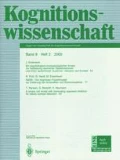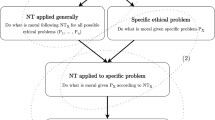Summary
The article elaborates on the view that ‘cognitive science’ can best be specified by its field of phenomena and its preferred type of explanations. The range of phenomena encompasses intelligence and intelligent behavior. They are rarely explained in the traditional Hempel-Oppenheim style (by referring to their necessary and sufficient preconditions); instead, genetic explanations prevail. A phenomenon is explained by introducing a cognitive system on which processes are possible which in turn result in the phenomenon to be explained. Thus, ‘cognitive science’ can be specified as the science of intelligence (describing the range of phenomena) and intelligent systems (as bases of explanations) claiming to offer a level of description and analysis suited to handle natural as well as artificial intelligence in the same framework. The current state is evaluated as characterized by more than a simple network of interdisciplinary collaborations and less than a well established discipline. The term ‘interdisciplin’ is coined to mark this state of ‘cognitive science’ with a common conceptual basis and a developing specific methodology on one hand and still strong bonds to the different origins (mainly psychology, computer science, linguistics, philosophy, and the neurosciences) on the other side.
Zusammenfassung
Der vorliegende Artikel erläutert die Spezifikation von „Kognitionswissenschaft“ durch Angabe ihres Gegenstandsbereiches und des von ihr präferierten Typs von Erklärungen. Der Gegenstandsbereich umfaßt Intelligenz und intelligentes Verhalten. Phänomene werden kaum nach dem üblichen Hempel-Oppenheim-Schema (durch Angabe notwendiger und hinreichender Bedingungen) erklärt; statt dessen überwiegen genetische Erklärungen. Ein Phänomen wird erklärt durch Einführung eines kognitiven Systems, das Prozesse ermö glicht, die ihrerseits zu eben diesem zu erklärenden Phänomen führen. Kognitionswissenschaft kann damit als Wissenschaft der Intelligenz und intelligenter Systeme spezifiziert werden, mit dem Anspruch, eine Ebene der Darstellung und Analyse zu bieten, die natü rliche und künstliche Intelligenz gleichermaßen zu erfassen vermag. Der aktuelle Status der Kognitionswissenschaft ist mehr als der eines Netzwerks interdisziplinärer Zusammenarbeit und weniger als der einer etablierten Disziplin. Der Ausdruck „Interdisziplin“ soll diesen Zustand charakterisieren, der einerseits durch eine gemeinsame konzeptuelle Basis und eine sich entwickelnde spezifische Methodologie, andererseits aber durch enge Bande mit den Herkunftsdisziplinen (v. a. Psychologie, Informatik, Linguistik, Philosophie und den Neurowissenschaften) gekennzeichnet ist.
Similar content being viewed by others
Literatur
Anderson, J. R. (1990). The adaptive character of thought. Hillsdale, NJ: Erlbaum
Bara, B. G. (1995). Cognitive science: A developmental approach to the simulation of the mind. Hove: Erlbaum
Binet, A., Simon, T. (1905). Méthodes nouvelles pour le diagnostique du niveau intellectuel des anormaux. Anneé Psychologique, 11, 191–244
Bruner, J. S., Goodnow, J. J., Austin, G. A. (1956). A study of thinking. New York, NY: Wiley
Estes, W. K. (1991). What is cognitive science? Psychological Science, 2, 282
Fodor, J. (1975). The language of thought. New York, NY: Thomas Y. Crowell
Fodor, J., Pylyshyn, Z. W. (1988). Connectionism and cognitive architecture: A critical analysis. In: S. Pinker, J. Mehler (eds), Connections and symbols (A COGNITION Special Issue) (pp. 3–71). Cambridge, MA: MIT Press
Freksa, C. (1995). Gasteditorial: KI 6/95 (Themenheft KI und Kognition), 6–7
Herrmann, T. (1994). Forschungsprogramme. In: T. Herrmann, W. H. Tack (Hrsg.), Methodologische Grundlagen der Psychologie (Enzyklopädie der Psychologie, Themenbereich B: Methodologie und Methoden, Serie I: Forschungsmethoden der Psychologie, Bd. 1) (S. 251–294). Göttingen: Hogrefe
Hunt, E. B. (1962). Concept learning: An information processing problem. New York, NY: Wiley
Hunt, E. B., Hovland, C. I. (1961). Programming a model of human concept formulation. Proceedings of the Western Joint Computer Conference (pp. 145–155)
Keil, F. C. (1991). On being more than the sum of the parts: The conceptual coherence of cognitive science. Psychological Science, 2, 283–293
Luger, G. F. (1994). Cognitive science; The science of intelligent systems. New York,NY: Academic Press
Marr, D. (1982). Vision. San Francisco, CA: Freeman
Mittelstraß, J. (1987). Die Stunde der Interdisziplinarität? In: J. Kocka (Hrsg.), Interdisziplinarit:at: Praxis — Herausforderung — Ideologie (S. 152–158). Frankfurt: Suhrkamp
Newell, A. (1982). The knowledge level. Artificial Intelligence, 18, 87–127
Pylyshyn, Z. W. (1984). Computation and cognition: Toward a foundation for cognitive science. Cambridge, MA: MIT Press
Research Briefings (1983). Washington, DC: National Academy Press
Russell, S., Norvig, P. (1995). Artificial intelligence: A modern approach. Eaglewood Cliffs: Prentice Hall
Russell, S., Wefald, E. (1991). Do the right thing: Studies in limited rationality. Cambridge, MA: MIT Press
Schunn, C. D., Okada, T., Crowley, K. (1995). Is cognitive science truly interdisciplinary? The case of interdisziplinary collaborations. In: Proceedings of the 17th annual conference of the Cognitive Science Society (pp. 100–105). Mahwah, NJ: Erlbaum
Simon, H. A. (1985). The science of the artificial (2nd edn.). Cambridge, MA: MIT Press
Simon, H. A. (1993). Homo rationalis: Die Vernunft im menschlichen Leben. Frankfurt: Campus
Stegmüller, W. (1969). Probleme und Resultate der Wissenschaftstheorie und Analytischen Philosophie, Bd. 1, Wissenschaftliche Erklärung und Begründung. Berlin, Heidelberg, New York: Springer
Stern, W. (1950). Allgemeine Psychologie auf personalistischer Grundlage. Den Haag: Mouton
Tack, W. H. (1991). Uber den Status von Wissen und anderen Kognitionen. In: K. Grawe, R. Hänni, N. Semmer, F. Tschan (Hrsg.), Uber die richtige Art, Psychologie zu betreiben (S. 255–269). Göttingen: Hogrefe
Thurstone, L. L. (1938). Primary and mental abilities. Chicago, NJ: University of Chicago Press
Wallach, D. (im Druck). Kognitionswissenschaftliche Analyse komplexer Problemlöseprozesse. Wiesbaden: Westdeutscher Verlag
Wechsler, D. (1964). Die Messung der Intelligenz Erwachsener (3. Aufl.). Bern: Huber
Author information
Authors and Affiliations
Additional information
Vortrag des Gründungsvorsitzenden auf der 2. Fachtagung der Gesellschaft für Kognitionswissenschaft am 13.–16. März 1996 in Hamburg.
Rights and permissions
About this article
Cite this article
Tack, W.H. Kognitionswissenschaft: eine Interdisziplin. Kognit. Wiss. 6, 2–8 (1996). https://doi.org/10.1007/s001970050025
Published:
Issue Date:
DOI: https://doi.org/10.1007/s001970050025




